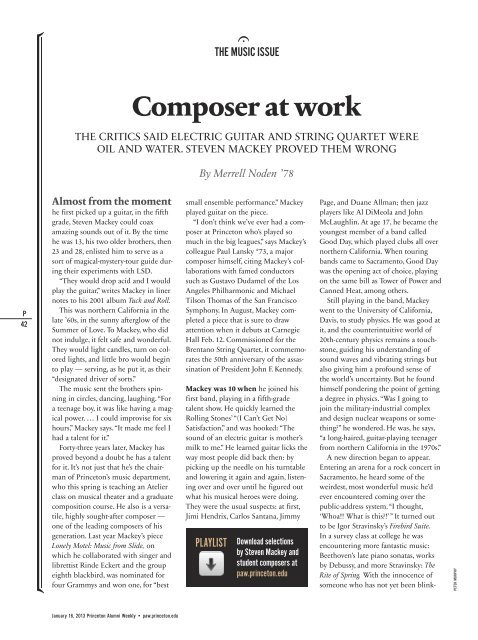Musical machines - Princeton Alumni Weekly - Princeton University
Musical machines - Princeton Alumni Weekly - Princeton University
Musical machines - Princeton Alumni Weekly - Princeton University
You also want an ePaper? Increase the reach of your titles
YUMPU automatically turns print PDFs into web optimized ePapers that Google loves.
P<br />
42<br />
Almost from the moment<br />
he first picked up a guitar, in the fifth<br />
grade, Steven Mackey could coax<br />
amazing sounds out of it. By the time<br />
he was 13, his two older brothers, then<br />
23 and 28, enlisted him to serve as a<br />
sort of magical- mystery-tour guide during<br />
their experiments with LSD.<br />
“They would drop acid and I would<br />
play the guitar,” writes Mackey in liner<br />
notes to his 2001 album Tuck and Roll.<br />
This was northern California in the<br />
late ’60s, in the sunny afterglow of the<br />
Summer of Love. To Mackey, who did<br />
not indulge, it felt safe and wonderful.<br />
They would light candles, turn on colored<br />
lights, and little bro would begin<br />
to play — serving, as he put it, as their<br />
“designated driver of sorts.”<br />
The music sent the brothers spinning<br />
in circles, dancing, laughing. “For<br />
a teenage boy, it was like having a magical<br />
power. ... I could improvise for six<br />
hours,” Mackey says. “It made me feel I<br />
had a talent for it.”<br />
Forty-three years later, Mackey has<br />
proved beyond a doubt he has a talent<br />
for it. It’s not just that he’s the chairman<br />
of <strong>Princeton</strong>’s music department,<br />
who this spring is teaching an Atelier<br />
class on musical theater and a graduate<br />
composition course. He also is a versatile,<br />
highly sought-after composer —<br />
one of the leading composers of his<br />
generation. Last year Mackey’s piece<br />
Lonely Motel: Music from Slide, on<br />
which he collaborated with singer and<br />
librettist Rinde Eckert and the group<br />
eighth blackbird, was nominated for<br />
four Grammys and won one, for “best<br />
January 16, 2013 <strong>Princeton</strong> <strong>Alumni</strong> <strong>Weekly</strong> • paw.princeton.edu<br />
small ensemble performance.” Mackey<br />
played guitar on the piece.<br />
“I don’t think we’ve ever had a composer<br />
at <strong>Princeton</strong> who’s played so<br />
much in the big leagues,” says Mackey’s<br />
colleague Paul Lansky *73, a major<br />
composer himself, citing Mackey’s collaborations<br />
with famed conductors<br />
such as Gustavo Dudamel of the Los<br />
Angeles Philharmonic and Michael<br />
Tilson Thomas of the San Francisco<br />
Symphony. In August, Mackey completed<br />
a piece that is sure to draw<br />
attention when it debuts at Carnegie<br />
Hall Feb. 12. Commissioned for the<br />
Brentano String Quartet, it commemorates<br />
the 50th anniversary of the assassination<br />
of President John F. Kennedy.<br />
Mackey was 10 when he joined his<br />
first band, playing in a fifth-grade<br />
talent show. He quickly learned the<br />
Rolling Stones’ “(I Can’t Get No)<br />
Satisfaction,” and was hooked: “The<br />
sound of an electric guitar is mother’s<br />
milk to me.” He learned guitar licks the<br />
way most people did back then: by<br />
picking up the needle on his turntable<br />
and lowering it again and again, listening<br />
over and over until he figured out<br />
what his musical heroes were doing.<br />
They were the usual suspects: at first,<br />
Jimi Hendrix, Carlos Santana, Jimmy<br />
PLAYLIST<br />
THE MUSIC ISSUE<br />
Composer at work<br />
THE CRITICS SAID ELECTRIC GUITAR AND STRING QUARTET WERE<br />
OIL AND WATER. STEVEN MACKEY PROVED THEM WRONG<br />
By Merrell Noden ’78<br />
Download selections<br />
by Steven Mackey and<br />
student composers at<br />
paw.princeton.edu<br />
Page, and Duane Allman; then jazz<br />
players like Al DiMeola and John<br />
McLaughlin. At age 17, he became the<br />
youngest member of a band called<br />
Good Day, which played clubs all over<br />
northern California. When touring<br />
bands came to Sacramento, Good Day<br />
was the opening act of choice, playing<br />
on the same bill as Tower of Power and<br />
Canned Heat, among others.<br />
Still playing in the band, Mackey<br />
went to the <strong>University</strong> of California,<br />
Davis, to study physics. He was good at<br />
it, and the counterintuitive world of<br />
20th-century physics remains a touchstone,<br />
guiding his understanding of<br />
sound waves and vibrating strings but<br />
also giving him a profound sense of<br />
the world’s uncertainty. But he found<br />
himself pondering the point of getting<br />
a degree in physics. “Was I going to<br />
join the military-industrial complex<br />
and design nuclear weapons or something?”<br />
he wondered. He was, he says,<br />
“a long-haired, guitar-playing teenager<br />
from northern California in the 1970s.”<br />
A new direction began to appear.<br />
Entering an arena for a rock concert in<br />
Sacramento, he heard some of the<br />
weirdest, most wonderful music he’d<br />
ever encountered coming over the<br />
public-address system. “I thought,<br />
‘Whoa!! What is this?!’” It turned out<br />
to be Igor Stravinsky’s Firebird Suite.<br />
In a survey class at college he was<br />
encountering more fantastic music:<br />
Beethoven’s late piano sonatas, works<br />
by Debussy, and more Stravinsky: The<br />
Rite of Spring. With the innocence of<br />
someone who has not yet been blink-<br />
PETER MURPHY


